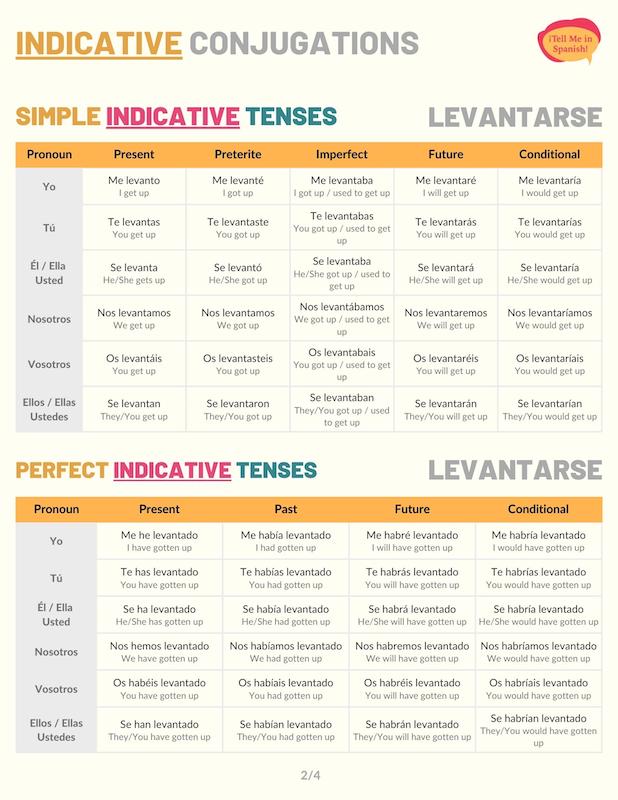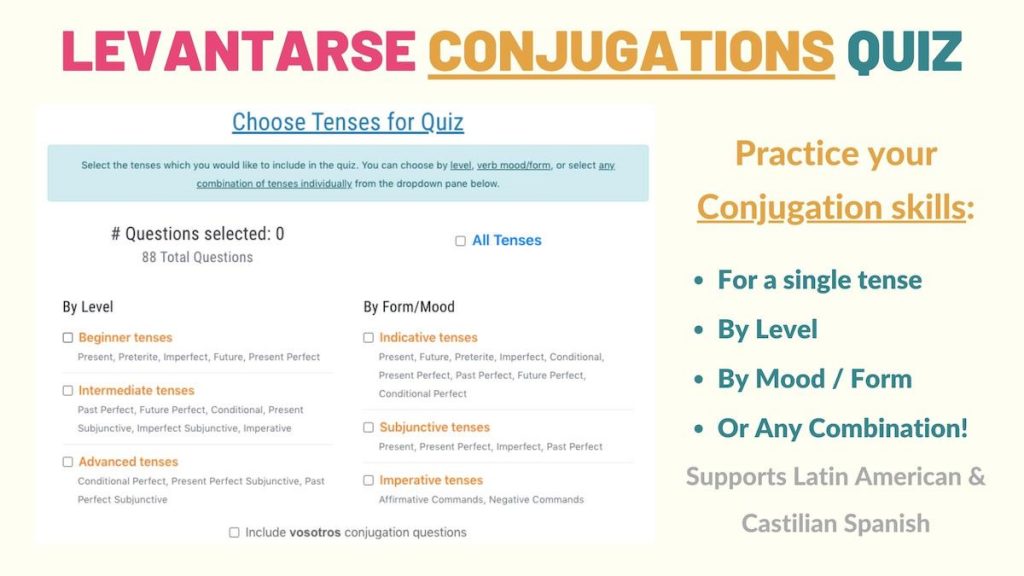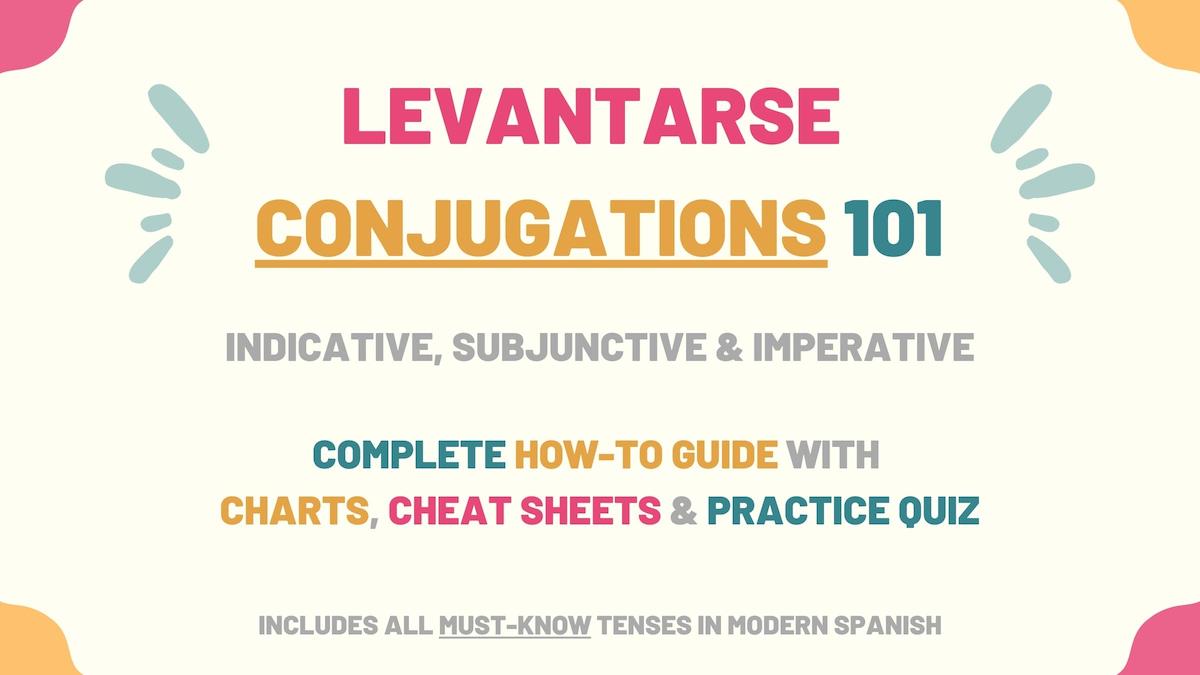Levantarse is one of the most common Spanish reflexive verbs for daily routines. Given that it can help you practice -AR reflexive conjugations, in this guide, we’ll review the levantarse conjugation patterns. Here is what we’ll cover.
- Levantarse Overview
- Indicative Tenses of Levantarse Conjugations
- Subjunctive Tenses of Levantarse Conjugations
- Imperative (Commands) of Levantarse Conjugations
- Uses & Examples
- Download Levantarse Conjugation Tables & Uses Cheat sheets
- Levantarse Conjugation Practice Quiz
Overview of Levantarse
| Verb Characteristic | Property |
|---|---|
| Verb Type | -AR |
| Irregular | No |
| Infinitive | Levantarse |
| Gerund (Present Participle) Form | Levantando |
| Past Participle Form | Levantado |
| Synonyms | Despertarse, animarse, alzar |
Indicative Conjugations of Levantarse
Present tense
Levantarse reflexive conjugations in the present tense can be used to say that someone gets up. For example: Yo me levanto temprano todos los días.
Notice that, with this levantarse conjugation, you must place the reflexive pronoun before the verb.
| Person | Conjugation | Translation |
|---|---|---|
| Yo | Me levanto | I get up |
| Tú | Te levantas | You get up |
| Él / Ella Usted | Se levanta | He/She gets up You (formal) get up |
| Nosotros | Nos levantamos | We get up |
| Vosotros | Os levantáis | You get up |
| Ellos / Ellas Ustedes | Se levantan | They get up You (plural) get up |
Preterite tense
The levantarse preterite conjugations expresses that someone got up at a specific moment in the past. For instance: Ayer, Juan se levantó de malas.
| Person | Conjugation | Translation |
|---|---|---|
| Yo | Me levanté | I got up |
| Tú | Te levantaste | You got up |
| Él / Ella Usted | Se levantó | He/She got up You (formal) got up |
| Nosotros | Nos levantamos | We got up |
| Vosotros | Os levantasteis | You got up |
| Ellos / Ellas Ustedes | Se levantaron | They got up You (plural) got up |
Imperfect tense
The imperfect conjugations of levantarse is used to talk about one’s past habits in regards to getting out of bed. Check this example: Mis papás se levantaban temprano todos los días.
| Person | Conjugation | Translation |
|---|---|---|
| Yo | Me levantaba | I got up I used to get up |
| Tú | Te levantabas | You got up You used to get up |
| Él / Ella Usted | Se levantaba | He/She got up He/She used to get up You (formal) got up You (formal) used to get up |
| Nosotros | Nos levantábamos | We got up We used to get up |
| Vosotros | Os levantabais | You got up You used to get up |
| Ellos / Ellas Ustedes | Se levantaban | They got up They used to get up You (plural) got up You (plural) used to get up |
Near future
To form this levantarse reflexive conjugation, you must use a reflexive pronoun + ir in present tense + a + levantar. The near future in Spanish conveys that someone is getting up soon. Mañana me voy a levantar más temprano.
| Person | Conjugation | Translation |
|---|---|---|
| Yo | Voy a levantarme | I’m going to get up |
| Tú | Vas a levantarte | You’re going to get up |
| Él / Ella Usted | Va a levantarse | He/She is going to get up You (formal) are going to get up |
| Nosotros | Vamos a levantarnos | We’re going to get up |
| Vosotros | Vais a levantaros | You’re going to get up |
| Ellos / Ellas Ustedes | Van a levantarse | They’re going to get up You (plural) are going to get up |
Take Note: If a conjugated verb precedes a verb in the infinitive form, object pronouns in Spanish (reflexive, direct, and indirect) can be placed before the main verb or attached to the infinitive. Me voy a levantar or voy a levantarme are equally correct.
Future simple tense
In Spanish, the future simple levantarse conjugation expresses that someone will get up in the future. For instance: ¿A qué hora se levantarán mañana?
| Person | Conjugation | Translation |
|---|---|---|
| Yo | Me levantaré | I will get up |
| Tú | Te levantarás | You will get up |
| Él / Ella Usted | Se levantará | He/She will get up You (formal) will get up |
| Nosotros | Nos levantaremos | We will get up |
| Vosotros | Os levantaréis | You (formal) will get up |
| Ellos / Ellas Ustedes | Se levantarán | They will get up You (plural) will get up |
Conditional tense
Conjugate this verb to the Spanish conditional tense to say that someone would get up. If applicable to your statement, you can use si sentences to express the conditions that need to occur for this to happen. Si no tuviéramos que trabajar, nos levantaríamos más tarde.
| Person | Conjugation | Translation |
|---|---|---|
| Yo | Me levantaría | I would get up |
| Tú | Te levantarías | You would get up |
| Él / Ella Usted | Se levantaría | He/She would get up You (formal) would get up |
| Nosotros | Nos levantaríamos | We would get up |
| Vosotros | Os levantaríais | You would get up |
| Ellos / Ellas Ustedes | Se levantarían | They would get up You (plural) would get up |
Present perfect tense
The formula and order to conjugate the present perfect in Spanish is reflexive pronouns + haber’s present forms + past participle verb (levantado, in this case). Use these levantar conjugations to talk about whether someone has gotten up or not.
For example: Esteban todavía no se ha levantado.
| Person | Conjugation | Translation |
|---|---|---|
| Yo | Me he levantado | I have gotten up |
| Tú | Te has levantado | You have gotten up |
| Él / Ella Usted | Se ha levantado | He/She has gotten up You (formal) have gotten up |
| Nosotros | Nos hemos levantado | We have gotten up |
| Vosotros | Os habéis levantado | You have gotten up |
| Ellos / Ellas Ustedes | Se han levantado | They have gotten up You (plural) have gotten up |
Take Note: When it comes to perfect tenses, you must always place the reflexive pronoun before the verb haber.
Past perfect
Use this levantar conjugation to say someone had gotten up before another past action. The Spanish past perfect tense is created with haber imperfect forms + levantado. Don’t forget to add the proper pronoun to the corresponding levantarse reflexive conjugation.
For instance: Cuando fui a tu cuarto, todavía no te habías levantado.
| Person | Conjugation | Translation |
|---|---|---|
| Yo | Me había levantado | I had gotten up |
| Tú | Te habías levantado | You had gotten up |
| Él / Ella Usted | Se había levantado | He/She had gotten up You (formal) had gotten up |
| Nosotros | Nos habíamos levantado | We had gotten up |
| Vosotros | Os habíais levantado | You had gotten up |
| Ellos / Ellas Ustedes | Se habían levantado | They had gotten up You (plural) had gotten up |
Future perfect
The future perfect conjugations of this verb convey that someone will have gotten up by or before a future moment in time. Al final de este mes, me habré levantado temprano todos los días.
| Person | Conjugation | Translation |
|---|---|---|
| Yo | Me habré levantado | I will have gotten up |
| Tú | Te habrás levantado | You will have gotten up |
| Él / Ella Usted | Se habrá levantado | He/She will have gotten up You (formal) will have gotten up |
| Nosotros | Nos habremos levantado | We will have gotten up |
| Vosotros | Os habréis levantado | You will have gotten up |
| Ellos / Ellas Ustedes | Se habrán levantado | They will have gotten up You (plural) will have gotten up |
Conditional perfect
Levantarse conjugation in the conditional tense is used to say that a person would have gotten up if a past condition had occurred. For instance: Si me hubieras dicho que te quería sentar, me habría levantado.
| Person | Conjugation | Translation |
|---|---|---|
| Yo | Me habría levantado | I would have gotten up |
| Tú | Te habrías levantado | You would have gotten up |
| Él / Ella Usted | Se habría levantado | He/She would have gotten up You (formal) would have gotten up |
| Nosotros | Nos habríamos levantado | We would have gotten up |
| Vosotros | Os habríais levantado | You would have gotten up |
| Ellos / Ellas Ustedes | Se habrían levantado | They would have gotten up You (plural) would have gotten up |
Progressive tenses
In Spanish, we use reflexive pronoun + estar conjugations + present participle (such as levantando) to form levantarse progressive conjugations. Use them to say that a person is getting up at the moment of speaking. Check this example: Ya, ya me estoy levantando.
| Progressive Tense | Formula | Translation Example |
|---|---|---|
| Present | (Reflexive pronoun) + estar (present) + levantando | I am getting up |
| Preterite | (Reflexive pronoun) + estar (preterite) + levantando | You were getting up |
| Imperfect | (Reflexive pronoun) + estar (imperfect) + levantando | He was getting up |
| Future | (Reflexive pronoun) + estar (future) + levantando | We will be getting up |
| Conditional | (Reflexive pronoun) + estar (conditional) + levantando | They would be getting up |
Take Note: When a conjugated verb works with a present participle in Spanish, reflexive pronouns can come before the main verb or attached to the gerund. So, it would be correct to say Me estoy levantando and estoy levantándome.
Levantarse Subjunctive Conjugations
In Spanish, the subjunctive mood refers to requests, recommendations, hypotheses, demands, advice, desires, and expectations. The following sections will teach each levantarse reflexive conjugation for the most important subjunctive tenses.
Present subjunctive
Levantarse conjugation in the present subjunctive is used to hope, demand, recommend, or expect someone to get up. For instance: Mi mamá quiere que nos levantemos antes de las 8.
| Person | Conjugation | Translation |
|---|---|---|
| Yo | Me levante | I get up |
| Tú | Te levantes | You get up |
| Él / Ella Usted | Se levante | He/She gets up You (formal) get up |
| Nosotros | Nos levantemos | We get up |
| Vosotros | Os levantéis | You get up |
| Ellos / Ellas Ustedes | Se levanten | They get up You (plural) get up |
Present perfect subjunctive
When conjugated to the present perfect subjunctive, levantarse expresses that someone expects or doubts that another person has already gotten up. Use haber present subjunctive forms + levantado to create this tense.
¿Crees que mi mamá ya se haya levantado?
| Person | Conjugation | Translation |
|---|---|---|
| Yo | Me haya levantado | I have gotten up |
| Tú | Te hayas levantado | You have gotten up |
| Él / Ella Usted | Se haya levantado | He/She has gotten up You (formal) have gotten up |
| Nosotros | Nos hayamos levantado | We have gotten up |
| Vosotros | Os hayáis levantado | You have gotten up |
| Ellos / Ellas Ustedes | Se hayan levantado | They have gotten up You (plural) have gotten up |
Imperfect subjunctive
Use the imperfect subjunctive conjugations of levantarse to talk about your past recommendations, demands, or expectations about someone getting up. For instance: Te dije que te levantaras temprano.
As shown in the levantarse conjugation chart below, Latin American and Castilian Spanish use different endings for the imperfect subjunctive tense:
Latin American Spanish version
| Person | Conjugation | Translation |
|---|---|---|
| Yo | Me levantara | I got up |
| Tú | Te levantaras | You got up |
| Él / Ella Usted | Se levantara | He/She got up You (formal) got up |
| Nosotros | Nos levantáramos | We got up |
| Ellos / Ellas Ustedes | Se levantaran | They got up You (plural) got up |
Note: The previous conjugation chart doesn’t include vosotros because this pronoun is not used in Latin American Spanish.
Castilian Spanish version
| Person | Conjugation | Translation |
|---|---|---|
| Yo | Me levantase | I got up |
| Tú | Te levantases | You got up |
| Él / Ella Usted | Se levantase | He/She got up You (formal) got up |
| Nosotros | Nos levantásemos | We got up |
| Vosotros | Os levantaseis | You got up |
| Ellos / Ellas Ustedes | Se levantasen | They got up You (plural) got up |
Past perfect subjunctive
The past perfect conjugations of levantarse convey that a person would have gotten up if a past condition had been fulfilled. These forms can also show regret for not getting up. Si hubiera tenido cosas que hacer, me hubiera leventando temprano.
| Person | Conjugation | Translation |
|---|---|---|
| Yo | Me hubiera levantado | I had gotten up |
| Tú | Te hubieras levantado | You had gotten up |
| Él / Ella Usted | Se hubiera levantado | He/She had gotten up You (formal) had gotten up |
| Nosotros | Nos hubiéramos levantado | We had gotten up |
| Vosotros | Os hubierais levantado | You had gotten up |
| Ellos / Ellas Ustedes | Se hubieran levantado | They had gotten up You (plural) had gotten up |
Levantarse Imperative Conjugations
In Spanish, we conjugate a verb to the imperative form to order people to do or not do something.
Affirmative commands
Use the affirmative commands of levantarse to order someone to get up. Levántate, estás sentado en el control.
| Person | Conjugation | Translation |
|---|---|---|
| Tú | Levántate | Get up |
| Usted | Levántese | Get up |
| Vosotros | Levantaos | Get up |
| Ustedes | Levántense | Get up |
Take Note: With affirmative commands, reflexive pronouns are attached to the verb.
Negative commands
To command someone not to get up, conjugate this verb to the negative imperative. For example: No se levanten, yo abro.
| Person | Conjugation | Translation |
|---|---|---|
| Tú | No te levantes | Don’t get up |
| Usted | No se levante | Don’t get up |
| Vosotros | No os levantéis | Don’t get up |
| Ustedes | No se levanten | Don’t get up |
Meanings of Levantarse & Examples
Now that you know how to conjugate levantarse, check these examples of how to use this verb. As the direct translation of ‘to get up’, this verb can be used to talk about getting out of bed or standing up.
[Levantar conjugated] + [complement]
Mi hermano siempre se levanta en la noche.
My brother always gets up at night.
Levántate y déjale tu asiento a la señora.
Get up and leave your seat to the lady.
Cuando era niña, me levantaba muy temprano.
When I was a kid, I used to wake up very early.
Take Note: Levantar (non-reflexive form) is used to say that someone wakes up another person or picks something up from the floor. For example: Levanta tus juguetes, por favor. This non-reflexive form can work with direct object pronouns.
Download Levantarse Conjugation Charts & Uses Cheat sheet

Levantarse is a common and useful verb in everyday Spanish for describing one’s daily routines. Since it’s a reflexive verb, it can take some time for beginners to familiarize themselves with its conjugations. I’ve compiled a cheat sheet PDF with all of the levantarse conjugation charts along with real-world examples you can see on how to apply this verb to your Spanish conversations.
Practice Quiz: Levantarse Conjugation

Congratulations! You’ve now learned how to conjugate levantarse in Spanish. The next step is to take the levantarse conjugation practice quiz where you can put your skills of conjugating regular -AR reflexive verbs to the test.

